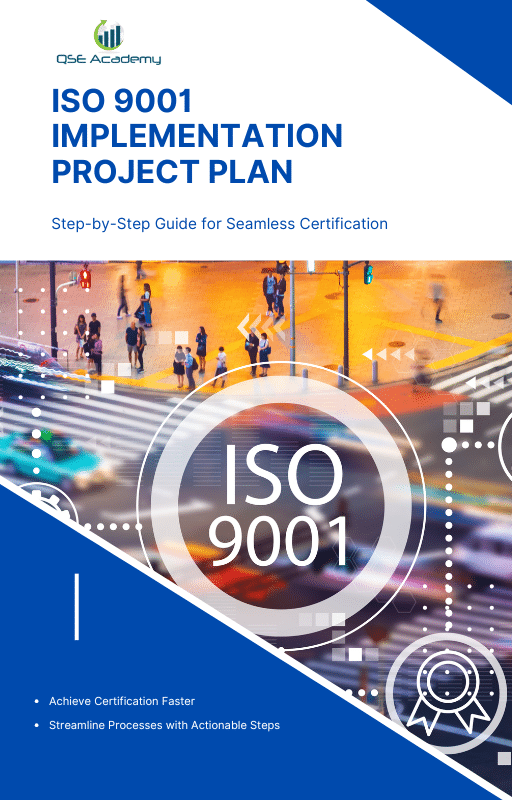Why iso 9001 certification is important?
Why iso 9001 certification is important?
Have you ever wondered, why ISO 9001 certification is important? Maybe you’ve heard the term tossed around in business conversations or seen it listed as a requirement in contracts. It’s natural to be curious about what makes this certification such a big deal. Well, the answer lies in its ability to transform the way organizations operate, ensuring better quality, greater efficiency, and stronger customer trust.
ISO 9001 certification is more than just a badge of honor—it’s a global standard that proves a business is serious about delivering consistent quality. Whether you’re a small local business or a multinational corporation, ISO 9001 helps you build trust with customers, streamline operations, and stay ahead of the competition.
In this article, we’re going to explore why ISO 9001 certification is important. From improving processes to winning more customers, you’ll see how this certification can benefit businesses of all sizes and industries. Ready to find out what makes ISO 9001 so valuable? Let’s dive in!
What Does ISO 9001 Certification Mean?
Before we dive deeper into why ISO 9001 certification is important, let’s take a moment to understand what it actually represents. ISO 9001 is an internationally recognized standard for quality management systems (QMS). It’s like a blueprint for businesses, guiding them to consistently deliver products and services that meet customer expectations.
Getting ISO 9001 certified means your organization has been audited and found to comply with this global standard. In simpler terms, it’s proof that your business values quality, efficiency, and customer satisfaction. This certification signals to the world—customers, partners, and even competitors—that you take your operations seriously and are committed to continuous improvement.
Why is this such a big deal? Because in today’s competitive market, trust and credibility are everything. When you’re ISO 9001 certified, you’re telling your customers that they can count on you for reliable, high-quality results every time. This is just one of the reasons why ISO 9001 certification is important—it gives your business an edge that’s recognized worldwide.
Plus, ISO 9001 isn’t a one-size-fits-all approach. It’s flexible and designed to work for businesses of all sizes and industries. Whether you’re running a small café or managing a multinational supply chain, this standard helps you streamline processes, improve customer satisfaction, and reduce inefficiencies.
Now that you know what ISO 9001 certification means, let’s dive into the real question: why ISO 9001 certification is important for your business. Spoiler alert—it’s about way more than just ticking boxes! Let’s explore the key reasons next.
The Key Reasons Why ISO 9001 Certification Is Important
So, why ISO 9001 certification is important? It’s not just a fancy title to hang on your wall—it’s a game-changer for businesses of all shapes and sizes. Let’s break down the key reasons why this certification matters and how it can make a real difference for your organization.
1. Building Trust and Credibility
First and foremost, ISO 9001 certification helps build trust. Imagine you’re choosing between two companies offering the same product or service. One is ISO 9001 certified, and the other isn’t. Which one are you more likely to trust? Probably the one with the certification, right?
That’s because ISO 9001 shows your customers, partners, and stakeholders that you’re serious about quality. It’s like a stamp of approval from a global authority. This is one of the top reasons why ISO 9001 certification is important—it gives your business credibility and sets you apart from competitors who haven’t made the effort.
2. Improving Efficiency and Reducing Waste
ISO 9001 isn’t just about impressing customers; it’s also about improving how your business runs. By following the standard’s framework, you’ll streamline processes, reduce inefficiencies, and minimize waste. Think of it like decluttering your workspace—you’ll be amazed at how much smoother everything runs when you’re organized.
For businesses looking to save time and money, this is why ISO 9001 certification is important. It encourages you to analyze every aspect of your operations and find better, smarter ways of doing things. The result? A more productive team and better use of resources.
3. Gaining a Competitive Edge
In today’s crowded marketplace, standing out is no small feat. That’s where ISO 9001 certification comes in. It’s often a requirement for contracts, especially with government agencies or large corporations. If your competitors are certified and you’re not, you could be missing out on big opportunities.
This is why ISO 9001 certification is important if you want to stay ahead in your industry. It doesn’t just help you meet requirements—it shows that your business is ready to compete at the highest level.
4. Ensuring Customer Satisfaction
Happy customers are loyal customers, and ISO 9001 is all about putting your customers first. The standard focuses on understanding customer needs and delivering consistent results that meet (or exceed) their expectations. By improving your processes and focusing on quality, you’re creating a better experience for the people who matter most—your customers.
When you prioritize quality, it shows. That’s why so many businesses emphasize why ISO 9001 certification is important as part of their customer satisfaction strategy.
5. Supporting Continuous Improvement
One of the best things about ISO 9001 is its focus on continuous improvement. Certification isn’t just a one-time achievement; it’s a commitment to always getting better. Whether it’s tweaking a process, responding to customer feedback, or adapting to market changes, ISO 9001 helps you stay on top of your game.
This is a big reason why ISO 9001 certification is important. It pushes businesses to think long-term and keep improving, ensuring they stay competitive and relevant in an ever-changing world.
These are just a few of the reasons why ISO 9001 certification is important. From building trust to driving efficiency, the benefits of certification go far beyond the surface. In the next section, we’ll look at who benefits most from ISO 9001 certification—spoiler alert: it’s not just businesses! Let’s keep going.
Who Benefits from ISO 9001 Certification?
When discussing why ISO 9001 certification is important, it’s easy to focus on the businesses themselves. But the truth is, the benefits extend far beyond the organization getting certified. Let’s take a closer look at who really gains from ISO 9001 certification—and how it creates a ripple effect of positive change.
1. Small Businesses: Gaining Credibility and Confidence
For small businesses, why ISO 9001 certification is important is all about leveling the playing field. Competing with larger companies can be tough, especially when trust and reputation are on the line. ISO 9001 certification gives small businesses a powerful tool to demonstrate their commitment to quality, reliability, and professionalism.
It’s like earning a badge of trust that instantly reassures potential customers and partners. Plus, it provides a structured framework to improve operations, helping smaller organizations grow and scale with confidence.
2. Large Corporations: Ensuring Consistency Across the Board
Big businesses often operate across multiple locations, departments, and even countries. Ensuring consistent quality in such a complex environment can be a real challenge. This is why ISO 9001 certification is important for larger organizations—it creates a unified standard that everyone can follow.
Whether it’s manufacturing products, delivering services, or managing supply chains, ISO 9001 ensures that all parts of the business work together seamlessly. The result? A stronger reputation, happier customers, and fewer headaches.
3. Customers: Getting High-Quality, Reliable Products and Services
Let’s not forget the people who benefit the most—your customers! One of the main reasons why ISO 9001 certification is important is that it ensures a consistent focus on quality. Customers want to know they can rely on your products or services, and ISO 9001 certification gives them that peace of mind.
When customers see that a business is ISO 9001 certified, it tells them that quality is a top priority. This leads to greater trust, loyalty, and satisfaction—three things every business strives for.
4. Employees: Working in a More Organized and Positive Environment
Another reason why ISO 9001 certification is important is the positive impact it has on employees. The certification process encourages clear communication, defined roles, and efficient workflows. When employees know what’s expected of them and have the tools to succeed, they’re more engaged and productive.
ISO 9001 also fosters a culture of improvement, where employees are encouraged to contribute ideas and be part of the solution. This not only boosts morale but also leads to better teamwork and job satisfaction.
5. Partners and Stakeholders: Gaining Confidence in Your Business
ISO 9001 certification doesn’t just benefit your internal operations—it also strengthens your relationships with partners, investors, and stakeholders. These groups want to know that your business is well-managed, reliable, and focused on delivering results.
This is another reason why ISO 9001 certification is important. It provides external assurance that your organization operates efficiently and prioritizes quality, making it easier to attract partnerships, funding, and long-term collaborations.
As you can see, why ISO 9001 certification is important goes far beyond the organization itself. From customers and employees to partners and stakeholders, the ripple effects of certification touch every part of the business ecosystem. In the next section, we’ll explore how ISO 9001 certification supports long-term growth and continuous improvement. Let’s keep the momentum going!
Why ISO 9001 Certification Is a Long-Term Investment
When we talk about why ISO 9001 certification is important, it’s not just about short-term gains like impressing customers or landing big contracts (although those are great perks!). The real power of ISO 9001 lies in its ability to set your business up for long-term success. Think of it as an investment—not just in your processes but in your entire organization’s future.
1. Encouraging Continuous Improvement
One of the biggest reasons why ISO 9001 certification is important is its focus on continuous improvement. Certification isn’t a finish line—it’s a framework that pushes you to consistently evaluate and refine your processes. This means you’re not just meeting today’s expectations but staying ahead of tomorrow’s challenges.
For example, with ISO 9001, you’re encouraged to regularly gather feedback, analyze performance, and look for ways to improve. Over time, these small, consistent improvements lead to big results, helping your business stay competitive and adaptable.
2. Building a Resilient Organization
In business, change is the only constant. Whether it’s shifting customer demands, new regulations, or unexpected challenges, ISO 9001 helps you navigate the ups and downs. This is another reason why ISO 9001 certification is important—it encourages a proactive approach to risk management and problem-solving.
By identifying potential issues early and putting systems in place to address them, your business becomes more resilient. This means fewer surprises and smoother operations, even in uncertain times.
3. Strengthening Your Reputation Over Time
Reputation isn’t built overnight—it’s something you earn through consistent quality and reliability. ISO 9001 certification is a powerful tool for establishing and maintaining that reputation. Over time, customers and partners come to see your business as a trusted, dependable brand.
This long-term credibility is a key reason why ISO 9001 certification is important. It’s not just about getting certified once—it’s about maintaining those high standards and continually proving your commitment to quality.
4. Attracting and Retaining Top Talent
Great employees want to work for great companies. ISO 9001 certification helps you create an organized, efficient, and positive workplace, which naturally attracts top talent. It shows potential hires that your business values structure, clarity, and improvement.
Not only that, but retaining employees also becomes easier. When your team feels supported by clear processes and empowered to contribute to continuous improvement, they’re more likely to stick around. This is another reason why ISO 9001 certification is important for long-term success—it helps you build a strong, engaged workforce.
5. Saving Money in the Long Run
While achieving ISO 9001 certification requires some upfront investment, it’s a money-saver in the long term. By streamlining processes, reducing waste, and preventing costly mistakes, ISO 9001 helps you cut unnecessary expenses.
This is why so many organizations emphasize why ISO 9001 certification is important as a cost-effective solution. It’s not just about spending money—it’s about spending it wisely to create a more efficient, profitable operation.
Ultimately, why ISO 9001 certification is important comes down to its ability to drive long-term growth and sustainability. It’s an investment that pays off in countless ways, from happier customers and employees to a more resilient, efficient organization. In the next section, we’ll address some common misconceptions about ISO 9001 certification and why it’s more accessible than you might think. Let’s keep going!
Common Misconceptions About ISO 9001 Certification
When exploring why ISO 9001 certification is important, it’s easy to come across some myths and misconceptions that make the process seem more intimidating than it actually is. Let’s clear up a few of these misunderstandings so you can see the full picture of what ISO 9001 certification really means—and why it’s more accessible and beneficial than you might think.
1. “ISO 9001 Certification Is Only for Big Companies”
This is one of the most common myths, and it couldn’t be further from the truth. ISO 9001 is designed to work for organizations of all sizes, from small local businesses to global enterprises. Whether you’re a two-person startup or a multinational corporation, the principles of ISO 9001 can help you improve quality, streamline operations, and gain credibility.
For smaller businesses, this is why ISO 9001 certification is important—it provides a level playing field, helping you compete with larger companies by demonstrating your commitment to quality.
2. “It’s All About the Paperwork”
Another misconception is that ISO 9001 is just about creating endless piles of documents. While documentation is a part of the process, it’s not the main focus. ISO 9001 is about building systems and processes that work for your business, not against it. The paperwork exists to support consistency and accountability—not to create extra work for the sake of it.
This is why ISO 9001 certification is important: it’s about improving how your business operates, not drowning you in unnecessary bureaucracy.
3. “It’s Too Expensive for Most Businesses”
It’s true that there are costs involved in achieving ISO 9001 certification, but many organizations find that the benefits far outweigh the investment. From saving money through improved efficiency to gaining new business opportunities, the long-term value is undeniable.
For businesses wondering why ISO 9001 certification is important, the cost is an investment in better processes, happier customers, and a stronger reputation. And remember, the process can be scaled to fit your budget and business needs.
4. “ISO 9001 Certification Is Just for Manufacturing Companies”
While ISO 9001 has its roots in manufacturing, it’s now used across a wide range of industries, including healthcare, education, hospitality, and IT. Any organization that wants to improve quality and customer satisfaction can benefit from ISO 9001 certification.
This is why ISO 9001 certification is important no matter your industry—it’s a flexible framework that can be adapted to suit your unique goals and challenges.
5. “Once You’re Certified, the Work Is Done”
ISO 9001 certification isn’t a one-time achievement; it’s an ongoing commitment to quality and improvement. Businesses that truly embrace ISO 9001 use it as a tool for growth, regularly reviewing their processes and finding ways to get even better.
This is why ISO 9001 certification is important for long-term success—it keeps your business focused on delivering consistent value and adapting to changes in the market.
By clearing up these misconceptions, it’s easier to see why ISO 9001 certification is important for organizations of all sizes and industries. It’s not as complicated, expensive, or exclusive as it might seem—in fact, it’s one of the best ways to future-proof your business and build lasting trust with customers. In the next section, we’ll explore practical steps for achieving ISO 9001 certification. Let’s make it happen!
Practical Steps to Achieve ISO 9001 Certification
Now that we’ve covered why ISO 9001 certification is important, you might be thinking, “This sounds great, but how do I actually get certified?” Don’t worry—it’s more straightforward than you might think. Let’s walk through the practical steps to help your business achieve ISO 9001 certification, one step at a time.
1. Understand the ISO 9001 Standard
Before diving in, it’s essential to familiarize yourself with what ISO 9001 requires. The standard is built around key principles like customer focus, leadership, and continual improvement. You don’t need to memorize every detail right away, but understanding the basics will give you a clear picture of what’s expected.
This is why ISO 9001 certification is important—it provides a clear, structured framework for running a quality-driven business. Think of it as a roadmap to better operations and greater customer satisfaction.
2. Conduct a Gap Analysis
A gap analysis is like a reality check for your business. It helps you compare your current processes to ISO 9001 requirements and identify areas where improvements are needed. This step is crucial because it shows you exactly what to focus on and prevents you from wasting time on unnecessary changes.
For many businesses, this step highlights why ISO 9001 certification is important. It uncovers inefficiencies, inconsistencies, or risks you might not have noticed otherwise, giving you a chance to address them before they become bigger issues.
3. Create an Implementation Plan
Once you know where the gaps are, it’s time to create a plan to close them. Break the process into manageable steps and set realistic timelines. Involve your team in the planning process so everyone understands their role and feels invested in the outcome.
Remember, achieving certification is a team effort. This collaborative approach is one of the reasons why ISO 9001 certification is important—it aligns everyone in your organization around shared goals.
4. Update Your Processes and Documentation
This step involves putting your plan into action. You’ll need to update or create processes, procedures, and documentation to meet ISO 9001 standards. While this might sound like a lot of work, it’s really about creating clarity and consistency in how your business operates.
For example, you might document how customer feedback is handled, how quality checks are performed, or how training is delivered. These improvements don’t just help with certification—they make your business stronger and more efficient, which is another reason why ISO 9001 certification is important.
5. Train Your Team
ISO 9001 isn’t something you can achieve alone—it requires buy-in and participation from your entire team. Provide training to ensure everyone understands the new processes and why they matter. When your team feels confident and prepared, the certification process becomes much smoother.
This step also highlights why ISO 9001 certification is important for creating a positive workplace culture. It empowers employees by giving them clear responsibilities and showing them how their work contributes to the company’s success.
6. Conduct an Internal Audit
Before your official certification audit, it’s a good idea to perform an internal audit. This allows you to identify any remaining gaps or areas for improvement. Think of it as a dress rehearsal—it’s your chance to fine-tune everything before the real performance.
7. Schedule Your Certification Audit
The final step is to bring in an accredited certification body to conduct the official audit. They’ll evaluate your processes, documentation, and overall compliance with ISO 9001. If everything checks out, you’ll receive your certification—and with it, the trust and credibility that comes with being ISO 9001 certified.
Achieving ISO 9001 certification might seem like a big task, but when you break it down into these steps, it’s entirely doable. The journey itself often reveals why ISO 9001 certification is important—it helps you identify areas for growth, improve efficiency, and build a stronger, more cohesive business.
In the final section, we’ll recap the key takeaways and encourage you to take the next step toward ISO 9001 certification. You’ve got this! Let’s wrap things up!
Conclusion: Why ISO 9001 Certification Is Important
So, why ISO 9001 certification is important? By now, it’s clear that this certification is more than just a formal recognition—it’s a strategic tool for growth, improvement, and trust. Whether you’re a small business trying to stand out in a competitive market or a large organization managing complex operations, ISO 9001 certification brings value in countless ways.
First and foremost, ISO 9001 certification helps you build credibility with your customers, partners, and stakeholders. It shows that you’re committed to delivering consistent quality and meeting international standards. This trust can open doors to new opportunities, bigger contracts, and long-term success.
But the benefits don’t stop there. Another reason why ISO 9001 certification is important is its ability to streamline operations, reduce waste, and improve efficiency. It encourages you to take a closer look at your processes, refine them, and make smarter decisions. Over time, these small improvements add up to significant results, saving you time, money, and resources.
Let’s not forget the impact on your team. ISO 9001 certification fosters a culture of collaboration, accountability, and continuous improvement. Your employees will feel empowered knowing their work contributes to a bigger goal. And when your team is engaged and motivated, your entire business thrives.
Ultimately, the question of why ISO 9001 certification is important comes down to this: it’s about future-proofing your organization. It’s a way to ensure you’re always meeting customer needs, adapting to market changes, and staying competitive. It’s not just about where your business is today—it’s about where it’s headed.
If you’ve been on the fence about pursuing ISO 9001 certification, consider this your sign to take the next step. Yes, it takes effort, but the rewards—stronger operations, happier customers, and a more resilient business—are well worth it. Ready to get started? The journey to ISO 9001 certification begins now, and it’s one of the best decisions you’ll ever make for your business.
Looking for More Resources on ISO 9001?
Looking for ISO 9001 Resources Tailored to Your Industry?
If this article helped clarify ISO 9001, take the next step with our industry-focused tools designed to simplify your certification journey:
- ISO 9001 Documentation Kits by Industry: Whether you’re in manufacturing, construction, consulting, or healthcare — we have complete, ready-to-use documentation tailored for your sector.
- Online ISO 9001 Training: Learn how to implement ISO 9001 effectively with our easy-to-follow video lessons, real-world examples, and practical exercises.
- ISO 9001 Checklist: Download our step-by-step checklist to ensure your QMS meets all the 9001:2015 requirements from start to finish.
These resources are crafted to save you time, reduce stress, and help you achieve certification with confidence. Choose your industry and start now!

👋 Hi, I’m HAFSA, and for the past 12 years, I’ve been on a journey to
make ISO standards less intimidating and more approachable for everyone.
Whether it’s ISO 9001, ISO 22000, or the cosmetics-focused ISO 22716,
I’ve spent my career turning complex jargon into clear, actionable steps
that businesses can actually use. I’m not here to call myself an expert—I prefer “enthusiast” because I truly love what I do.
There’s something incredibly rewarding about helping people navigate food safety and quality management systems
in a way that feels simple, practical, and even enjoyable.
When I’m not writing about standards, you’ll probably find me playing Piano 🎹, connecting with people, or diving into my next big project💫.
I’m an engineer specialized in the food and agricultural industry
I have a Master’s in QHSE management and over 12 years of experience as a Quality Manager
I’ve helped more than 15 companies implement ISO 9001, ISO 22000, ISO 22716, GMP, and other standards
My clients include food producers, cosmetics manufacturers, laboratories, and service companies
I believe quality systems should be simple, useful, and efficient
Outside of work, I play piano and love learning something new every day
Let’s make ISO less about stress and more about success! 🙏

















